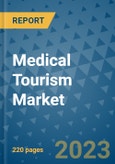The global market for medical tourism has experienced significant success as the world searches for affordable healthcare solutions. As medical tourism destinations enhance their offerings with advanced technologies like robotics, improved hospitality, state-of-the-art palliative care units, and easy access to drugs, the market has gained recognition and accreditation from an expanding international client base.
COVID-19 Causes Momentary Slump in Global Medical Tourism Market
The COVID-19 pandemic has temporarily impacted the global medical tourism market. However, despite the pandemic, the demand for medical tourism is expected to grow as healthcare costs rise in developed economies. While the coronavirus may initially dent the revenue of the medical tourism industry, with the rollout of vaccines and the eventual subsiding of the pandemic, the market is projected to regain momentum. The report suggests that developing economies need to swiftly implement measures to control the pandemic to benefit from the backlog of patients seeking elective surgeries through medical tourism.
Bariatric, Orthopedic, Ophthalmologic Surgeries to Earn Highest
Bariatric, orthopedic, and ophthalmologic surgeries have been among the highest revenue-generating procedures in the medical tourism industry. The demand for bariatric surgery, cancer treatments, and cardiovascular surgeries is expected to remain high throughout the forecast period. Orthopedic procedures such as hip and knee replacements will also be sought after by international clients. Dental procedures and cosmetic surgeries, which are relatively more affordable, will also attract medical tourists, according to Fairfield Market Research.
Fertility Tourism to Put Asia Pacific in the Lead
Fertility tourism is expected to lead to Asia Pacific's prominence in the medical tourism market. Key countries driving the market include Thailand, India, Malaysia, Turkey, Singapore, South Korea, and Taiwan, among others. Improved healthcare infrastructure, an increasing number of private hospitals, reduced language barriers, and internet accessibility have all contributed to the region's success. In recent years, countries like India, Iran, and Mexico have seen a rise in fertility tourism due to factors such as the growing demand for procedures like in vitro fertilization (IVF), artificial insemination, donor selection, and surrogacy. Lack of insurance coverage for fertility treatments has also led many individuals to seek fertility tourism, giving this segment significant momentum.
The research report includes an in-depth study of key players driving the global medical tourism market, such as Samitivej Hospitals, Bumrungrad International Hospital, Fortis Hospitals, Bangkok Hospital Group, and Apollo Hospitals Enterprise Ltd.
Table of Contents
Companies Mentioned
- Apollo Hospitals
- Curotrip
- Euromedical Tours
- Teknon Medical Center
- NTT Medical Center Tokyo
- Sourasky Medical Center (Ichilov)
- Samsung Medical Center
- KPJ Healthcare Berhad
- Bangkok Chain Hospitals
- Asian Heart Institute
- Others








